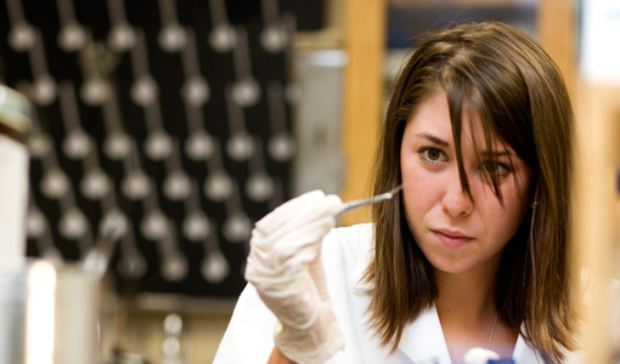Nearly 90 percent of undergraduate students in Catholic Studies are double majors. As students find, Catholic Studies’ interdisciplinary focus complements all other academic majors. Perspectives interviewed three students who are majoring in Catholic Studies and biochemisty
Hank KempFrom Williston, N.D., Hank Kemp is a senior. He intends to pursue a graduate degree in philosophy or the history of science, with a focus on bioethics.
I had developed an interest in theology, and I added a Catholic Studies major on the recommendation of a friend in Catholic Studies. Catholic Studies has added a deep richness to my liberal arts education at St. Thomas. I think science majors sometimes breeze through required liberal arts core curriculum courses without really engaging the material. Even some science classes seem more focused on a specific skill set rather than broad or deep knowledge of the topic. My Catholic Studies courses have offered me the kind of thorough engagement with the material and reflective knowledge that complements the more technical science training.
My Catholic Studies major has been invaluable to me as I pursue higher education in science because it keeps science in its proper relation to other academic disciplines. We often hear people appeal to the authority of science in such phrases as “scientists say…” or “scientific studies show…” Science can, indeed, tremendously benefit humanity by helping us better understand the beauty of God’s creation and showing us how we can use the gift of being stewards of that creation for the flourishing of humankind. Unfortunately, however, science is sometimes seen as an end in itself and not as a means to an end. Rather than uplifting humanity, it can work against human dignity. Science should be approached as a means to the proper end, and my Catholic Studies major has helped me understand that relation.
Susan SlatterySusan Slattery is a senior from Omaha, Neb. After graduation, she plans to attend medical school to pursue her interests in obstetrics, gynecology and the endocrine system.
I chose to combine a Catholic Studies major with a biochemistry major because my Catholic faith is very important to me. I wanted to pursue education based on truth and intellectual development. Since my beliefs are grounded in Catholicism, I recognized a need to better understand the Church and its teachings, which, in turn, would inform all other areas of my life including my science major. The two majors, in fact, complement each other nicely. Catholic Studies aims to educate students about the whole person in relation to God, while the sciences focus on the physical dimensions of the person and the world. The two majors reinforce each other, creating a bridge that helps map humanity in its physical, spiritual, emotional and social aspects.
I want to practice as a Catholic doctor, so I must have the intellectual and spiritual background to do so. The Catholic Studies program has helped me work toward this goal. Catholic Studies offers opportunities to grow in both knowledge and in relationship with God and with others. These insights help me deepen my understanding of how I can properly serve as a physician in light of the universal truths of the Church. In addition, there are important spiritual attitudes that accompany a life of service that I have encountered in Catholic Studies. These values, which include compassion, love, humility, community and reverence for human life, will transform the medical work that I plan to do. Catholic Studies has helped me better understand the human person as a composite of body and soul, one that requires well-rounded care.
Jim StokmanJim Stokman, a junior, is the oldest of seven children and is from the small northern Minnesota town of Crosby – small enough, he states, so that the size of the Stokman family was significant to the population. After graduation, he plans to continue his studies in medicine.
The question of why I am combining Catholic Studies and biochemistry majors is one I am often asked. As scientist and theologian John Polkinghorne once stated in a university address, “Religion in an Age of Science,” I, too, am someone “who wants to take absolutely seriously the possibility of religious belief in a scientific age.” As medical professions continue to advance and become increasingly specialized, it is important to maintain a larger perspective. While the advances in technology have taken medicine to a level that seemed impossible only a few years ago, there also looms the danger that medicine has become dehumanized. The human person’s need for the infinite can easily be lost in the demands of progress.
I am especially concerned with learning what it means to be human. I chose St. Thomas with its liberal arts core and, more specifically, a Catholic Studies major, because I believe that what I learn about humanity through the liberal arts will not only complement my future plans for medical work but also be an integral part of them. The Catholic Studies program educates from within the wisdom of the 2,000 year tradition of the Catholic Church, one that takes human nature seriously. In today’s cultural climate believers need to have a faith that is fully awake and aware. My Catholic Studies and biochemistry double major provides a beautiful starting point for practicing medicine and living life.







